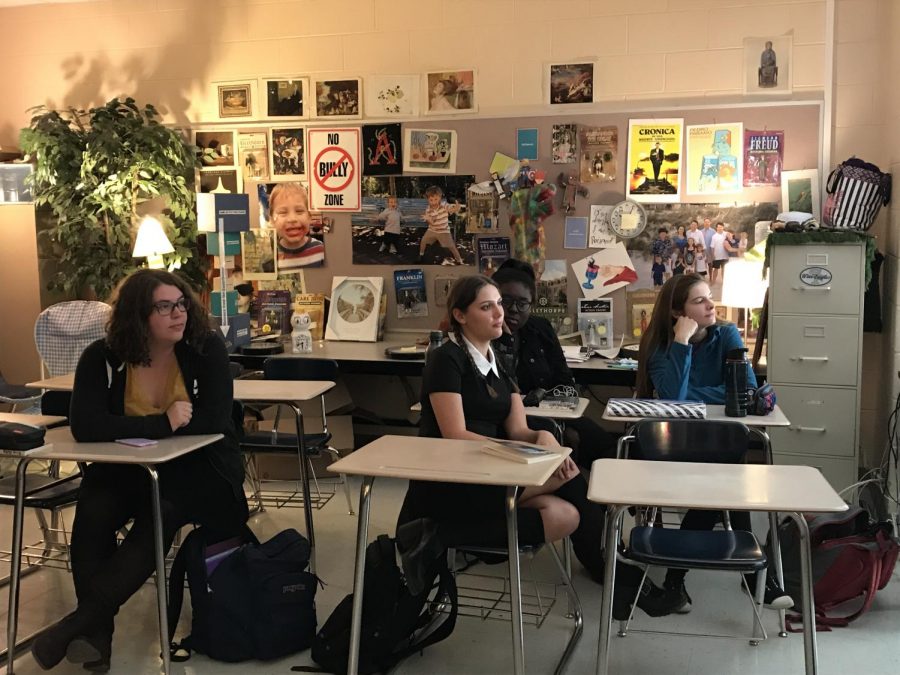Habitudes: A Movement in 21st Century Education
Erin Maley, Carly Bachism, Jordyn Paul-Slater, and Maiwenn Loheac engage in a Wednesday Habitudes lesson in Mr. Thompson’s IB Literature class. Mr. Thompson infuses his Habitudes lessons with knowledge from his TOK class.
October 31, 2017
South introduced Habitudes this year because administration and county level educators wished to initiate a dialogue between students and teachers about life skills required for the workplace after college. Businesses have raised doubt over millennial readiness for specific careers because a majority of students have shown they possess few real world abilities. Many lack professional skills and the maturity expected of working adults. The Habitudes initiative is expected to improve student character and facilitate mature discussions between educators and students. In coordination with Suicide Awareness, administrators are hopeful that habitudes will strengthen relationships between students and teachers. In a student survey last year, a surprising percentage of students shared that they felt uncomfortable to approach any of their teachers about a personal problem.
“Ms. Wilson felt that it was necessary to embrace the program because of the anxiety students struggle with” teacher Mr. Wolff said. “Habitudes is designed to combat depression and student anxiety. Our school is so large that we want each student to have a connection with a teacher so that they do not feel isolated. The survey indicated that students didn’t feel connected to adults.”
Some students criticized Habitudes for catering to the perceived naivety and narcissism of the millennial generation. Some students have expressed their belief that this is another “chicken-soup for the soul” movement in education. Companies are hopeful however, that schools will remedy cynical attitudes in future generations of students. To be well-rounded in today’s world is very attractive to employers and will provide Forsyth County students with an advantage over other similarly educated students.
Mr. Wolff, who teaches AP U.S. History, is South’s Habitudes leader. During the summer, he, Ms. Wilson, Ms. Tillery, Ms. Peace, Ms. Spurlock, Ms. Moraski, Mr. Shrier, and Mr. Miller attended a seminar in Downtown Atlanta for Habitudes training hosted by Growing Leaders. After this informative experience, Mr. Wolff and other staff members at South met throughout the summer to design the lessons and plan the future curriculum accordingly.
“I trained the staff at South with Ms. Spurlock during hour long sessions in pre-planning” Wolff said. “So far this year, I have rotated through various classrooms to assist teachers, and see first hand how Habitudes is impacting both them and their students. I have even written a song that informs and reminds students about the purpose of Habitudes.”
Experts originally designed Habitudes to serve the needs of students living in urban and underprivileged districts. There was a consensus among educators that inner-city students were more disadvantaged and prone to anxiety. However, this trend has also been witnessed in suburban school districts where pressure on students to succeed has become overwhelming. There were noticeable emotional problems and anxiety disorders in intelligent students who were taking AP and IB classes which surprised educators as these students were typically overlooked as being at risk. As a result of these studies, the concept of social and emotional learning developed into an educational concept that is designed to encompass the whole child.
“At our school, our approach to social and emotional learning was to institute habitudes as vehicle for introducing the philosophy” Wolff said. “Social and emotional learning is perceived as a new movement in education.”
Each habitudes ‘theme’ is a year long education initiative that changes the following year. Habitudes is designed as a four year rotating curriculum. Freshman students this year will have the opportunity to experience the entire program before graduating from high school. Mr. Wolff and other staff have scheduled Habitudes lessons to continue through AP exam season. Each topic lasts for two weeks and encompasses thirteen different lessons.
“Our goal is to stay committed to the program” Wolff said. “Our next step, as a team, is to survey the students and teachers about their experience with habitudes.”
“Growth mindset is an important aspect to social and emotional learning” Wolff stated. “I wrote a song on growth mindset for my AP U.S. History class last year to teach students. Other schools are integrating this into their curriculum as well. The county is hopeful that teachers will eventually implement habitudes into every lesson they teach.”
Educators are concerned with determining the strengths and weaknesses of students. This has been reinforced by social and emotional learning which is a pillar of personalized learning.
“Really, the whole idea is to find your own strengths and inspire others” Wolff said. “The teachers are equally capable of benefiting from habitudes, because the lessons are geared to serve everyone. Habitudes teaches positive life skills that will benefit students and teachers alike.”
Although Habitudes creators designed the curriculum specifically for improving the character of students, the millennial generation can be easily disillusioned by self-help philosophies.
“In the training, we pushed content that would be well received by millennials” Wolff said. “Although research points to the significance of social media in youth culture, it is important that in the digital age students understand how to communicate with each other face to face.”
Habitudes, a curriculum designed by Dr. Tim Elmore, has been used to instruct various Atlanta based companies, including Delta Global Services, Chick-fil-A, Inc., and The Home Depot about leadership skills. Growing Leaders, the non profit organization that funds Habitudes, was founded in 2003. Their mission statement is as follows, “Our process and resources are grounded in research and a unique understanding of the emerging generations, and recognize that leading others at any level begins with learning how to lead yourself.”
“We want to make Habitudes successful for teachers and the students in order to create positive impact on the entire school community which will help students achieve their full potential” Wolff said. “I have received a lot of positive feedback, but there is always room to improve and be more effective.”





